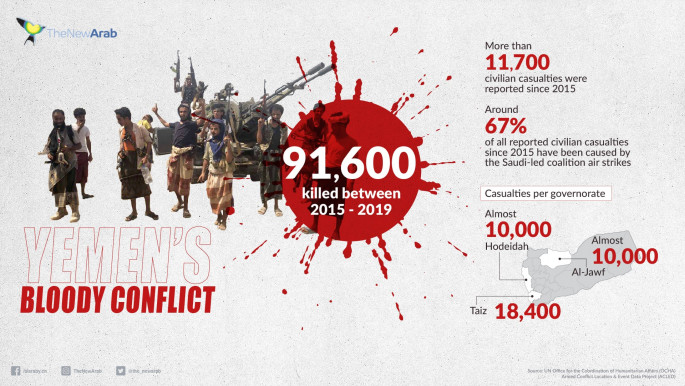
In Aden, a Saudi betrayal of Yemen is laid bare
Houthi fighters flooded the capital Sanaa in a move they described as a revolution. Their coup was successful and the capital, as well as many other provinces, have since been under their control.
Over the last four years, the Saudi-backed Yemeni government has been headquartered in Aden to run the country, particularly its Houthi-free areas.
But Aden is no longer under its grip. Earlier this month, the city plunged into chaos as UAE-backed southern separatists staged another coup against the same government.
The consequences of this recent coup cannot be underestimated, and the destructive move heralds an even bleaker future for Yemen.
Not only does it weaken the already floundering legitimacy of the Saudi-backed Yemeni government, but it also undermines the unity of the country and paves the way for fragmenting the nation. This time, the UAE is the coup champion.
This disappointing and unexpected development has opened a new chapter of conflict in Yemen's south, thanks to differences between proxy forces, UAE and Saudi Arabia.
Key to this change, is that the UAE was initially part of the Saudi-led coalition supporting the Yemeni government, but now appears to be working to ruin and eliminate this government from Yemen.
 |
Four and a half years later, Yemen has seen a second coup in the south in full view of Saudi rulers |  |
Early this month, the southern UAE-sponsored forces held a military parade in Aden. The Houthis in Sanaa fired a missile, killing 40 soldiers including a senior separatist commander.
The attack sparked a wave of southern fury against the Yemeni government and northerners in Aden. The separatist forces said the government officials had colluded with the Houthis in plotting the attack.
The situation escalated further reaching the point of no return, when armed confrontations between the UAE-backed separatists and pro-government forces erupted. Forty people were killed and 260 injured. The separatists took over government military camps and institutions in the city. The confrontations lasted three days and resulted in losses for the internationally recognised government.
 |
|
Yemen's interior minister Ahmed Almaisari, who was himself on the battlefield countering separatist attacks later posted on twitter, acknowledging defeat. He fled to Saudi Arabia where his president has been in exile since 2015.
On Tuesday, the secessionist forces advanced to Abyan province, kicking out the 350 government troops from Zinjibar city, about 60km from Aden.
On Thursday, the separatists headed towards Shabwa province, and engaged in heavy clashes with the pro-government forces in the main city of the province.
 |
Saudi Arabia's stance on the latest developments in Aden and Abyan is a naked betrayal of Yemen's government |  |
Their ambition is clear: independence from Yemen's north. The Emirati intention is also evident: an independent south that can be easily run by proxies.
The architects of Aden coup will not stop in Aden or Abyan. They plan to plant themselves in all southern provinces.
Amid these grave circumstances in Yemen, Saudi Arabia acts as if it has no part in this quagmire.
Its stance on the latest developments in Aden and Abyan is a naked betrayal of Yemen's government, people and unity.
Read more: Yemen in Focus: Will Israel join the deadly conflict?
It has been leading a destructive war in Yemen under the pretext of restoring the legitimate government, but now it allows a second coup against the same government. Saudi leadership appears to be condoning efforts to split Yemen into two, three or more states.
Saudi Arabia has lost any credibility, respect and value it might have had in the eyes of Yemenis, who have come to realise the degree of its fake support for Yemen's sovereignty and unity.
When President Abdu Rabbu Mansour Hadi officially requested military support in 2015 to confront the Houthi expansion, the Saudi-led coalition rushed to bomb the country.
They bombed military and civilian facilities alike. They imposed a blockade on Yemen and they starved millions of people and killed thousands.
Twitter Post
|
All that destruction apparently for the sake of ending the Houthi coup in the north. Four and a half years later, Yemen has seen a second coup in the south in the full view of Saudi rulers.
All that Saudi Arabia has done thus far is call for dialogue between the separatists and the government to be held in Jeddah. But realistically, no dialogue can bring the situation in the south to where it was prior to the latest escalations. It is too late for the Saudis to fix their historic mistakes in Yemen.
Suppose the dialogue between the two sides does not work. Will Saudi Arabia inaugurate a fresh era of violence and airstrikes, this time under the pretext of combating the UAE-backed southern separatists' coup against the government?
When the war flared up in 2015, there were two regional powers vying for hegemony in Yemen: Iran and Saudi Arabia. Now another has emerged: UAE. The war is now set to be prolonged at the expense of Yemen's unity, sovereignty and people.
Houthis' golden opportunity
The Houthis continue to accumulate power and enhance their military capabilities in line with the continuing rifts in the Saudi-led coalition.
Their attacks on Saudi oil facilities and airports have intensified and their opponents in Yemen are fighting one another. Their public image is being polished and their morale has soared. This is a golden opportunity to attract more supporters, particularly from the north.
Early this month, the UAE-backed militias in Aden deported dozens of northern citizens. They attacked their shops, restaurants and street stands, simply for being from the north.
Unlike in Aden, the Houthi-controlled areas have not seen any attacks on civilians who belong to the south. This scene of identity-based hate campaigns would not exist in Yemen had the Saudi-led coalition stuck to its stated goals.
 |
Yemenis have come to realise the degree of Saudi Arabia's fake support for Yemen's sovereignty and unity |  |
The Saudi-led coalition fighting the Iran-allied Houthis in Yemen is gradually crumbling, and the two-year old GCC crisis continues to loom in the background.
Presently, UAE is openly supporting southern separatists to undermine the authority of the Yemeni government, which has demanded the UAE's expulsion from the Saudi-led coalition.
Will the time come when the UAE and Saudi Arabia break away from one another? They arrived united to bomb Yemen, and they will return divided, leaving behind a country destroyed.
The writer is a Yemeni journalist, reporting from Yemen, whose identity we are protecting for their security.
Join the conversation: @The_NewArab
Opinions expressed in this article remain those of the author and do not necessarily represent those of The New Arab, its editorial board or staff.



